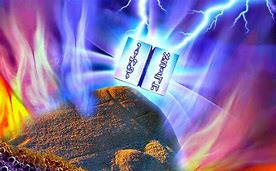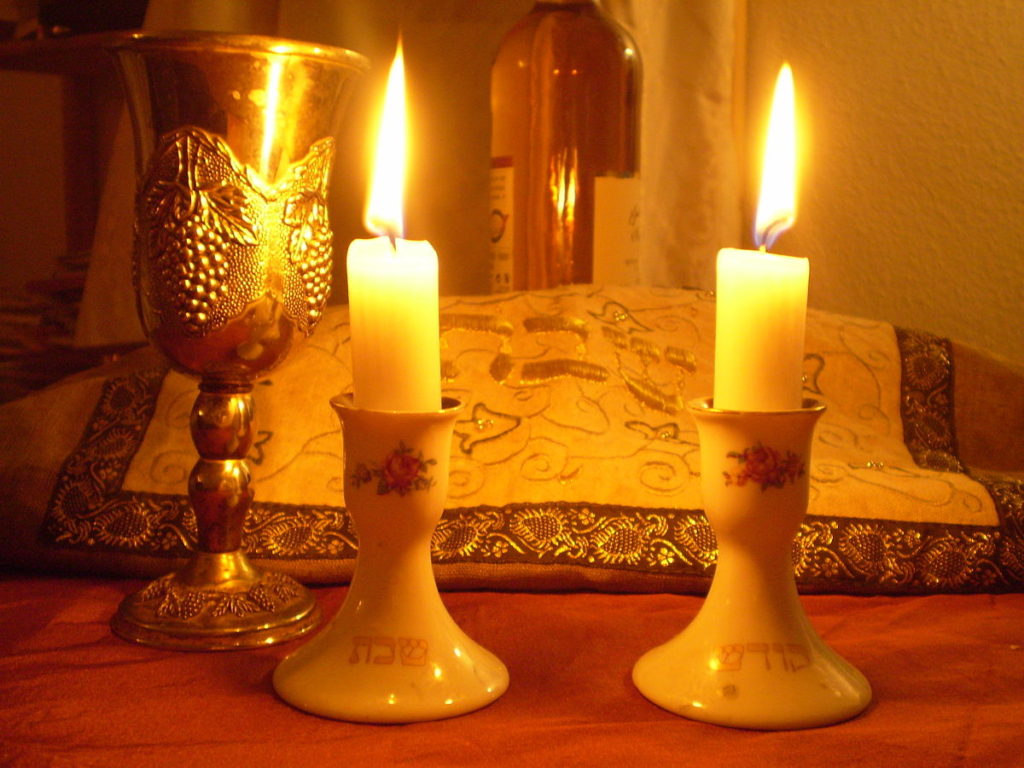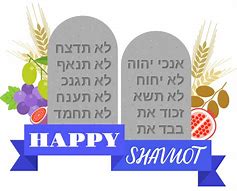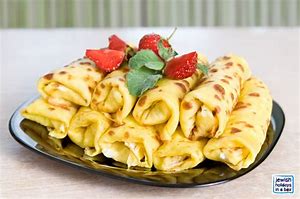A Very Very Simple Guide for Shavuot Celebration
(This Document contains G-d’s Name, therefore it may NOT be thrown out)
The holiday of Shavuot is the day on which we celebrate the great revelation of the giving of the Torah at Mount Sinai, 3,333 years ago. You stood at the foot of the mountain. Your grandparents and great-grandparents before them. The souls of all Jews, from all times, came together to hear the Ten Commandments from G‑d Himself.
Every year on the holiday of Shavuot we renew our acceptance of G‑d’s gift, and celebrate our identity.
The giving of the Torah was a far-reaching spiritual event—one that touched the essence of the Jewish soul for all times. Our sages have compared it to a wedding between G‑d and the Jewish people. Shavuot also means “oaths,” for on this day G‑d swore eternal devotion to us, and we in turn pledged everlasting loyalty to Him.

UNIQUE FEATURES OF SHAVUOT
- Women and girls light holiday candles to usher in the holiday, on both the first and second evenings of the holidays.
- It is customary to stay up all night learning Torah on the first night of Shavuot. (the night of Sunday May 16th). One explanation for this tradition is that the Jewish people did not rise early on the day G‑d gave the Torah, and it was necessary for G‑d Himself to awaken them. To compensate for their behavior, Jews have accepted upon themselves the custom of remaining awake all night.
- All men, women and children should go to the synagogue on the first day of Shavuot to hear the reading of the Ten Commandments.
- Since Shavuot is also called the “Harvest Festival,” it is customary to adorn the home and synagogue with fruits, flowers and greens. Furthermore, our Sages relate that although Mount Sinai was situated in a desert, when the Torah was given the mountain bloomed and sprouted flowers.
- As on other holidays, special meals are eaten, and no “work” may be performed.
- It is customary to eat dairy foods on Shavuot. Among other reasons, this commemorates the fact that upon receiving the Torah, including the kosher laws, the Jewish people could not cook meat in their pots, which had yet to be rendered kosher. Also, the Torah is likened to nourishing milk. The Hebrew word for milk is chalav, and when the numerical values of each of the letters in the word chalav are added together—8 + 30 + 2—the total is forty. Forty is the number of days Moses spent on Mount Sinai when receiving the Torah.
- On the second day of Shavuot, the Yizkor memorial service for the deceased is recited.
- Some communities read the Book of Ruth publicly, as King David—whose passing occurred on this day—was a descendant of Ruth, one of the most famous converts to Judaism.

All times are for Philadelphia PA
For times in your area go to:
http://www.chabad.org/calendar/candlelighting_cdo/aid/6226/jewish/Shabbat-Candle-Lighting-Times.htm
Women (or if there isn’t a woman in the house, the head of the household), light candles.
Say both prayers on both nights: Sunday May 16 at 7:52 pm and Monday May 17at 8.58 pm
Ba-ruch A-tah Ado-nai E-lo-hei-nu me-lech ha-olam asher ki-deshanu be-mitzvo-tav ve-tzvi-vanu Lehadlik Ner Shel Yom Tov
(Blessed are You, L-rd our G-d, King of the universe, who has sanctified us with His commandments and has commanded us light the candle of the Holiday.)
and
Ba-ruch A-tah Ado-nai E-lo-hei-nu me-lech ha-olam she-heche-ya-nu ve-ki-yi-ma-nu ve-higi-a-nu liz-man ha-zeh
(Blessed are You, Lord our G-d, King of the universe, who has granted us life, sustained us, and enabled us to reach this occasion.)

Evening Kiddush for Sunday and Monday Nights
Kiddush is recited while holding a cup of kosher wine or grape juice.
Ba-ruch atah A-do-nay, E-lo-hei-nu Melech Ha-Olam, borei pri ha’gefen.
[Blessed are You, L-rd, our G‑d, King of the universe, who created the fruit of the vine.]
Barukh atah A-do-nai, Elohaynu, melekh ha-olam asher bachar banu mee-kol am, v’rom’manu mee-kol lashon v’kee’d’shanu b’meetzvotav, va-teeten lanu, A-do-nai Elohaynu, b’ahavah mo’adeem l’seemchah,chageem u-z’maneem l’sason, et yom chag ha-Shavuos Hazeh Zeman matan Toraseine meekra kodesh, zeicher leetzeeyat meetz’rayeem Ki Vanu Vacharta V’osanu Keedashtsa Mikol Ha’smim U-mo’aday Kadsh’kha b’simchah u-v’sason hin’chal’tanu. Barukh atah Adonai, m’kadesh Yisra’el v’ha-z’manim. (Amein)
Blessed are you, Lord, our God, king of the universe who has chosen us from among all people, and exalted us above every tongue and sanctified us with His commandments, and you gave us, Lord our God, appointed festivals for gladness, festivals and times for joy, this day of the festival of Shavuos, the time of giving of the Torah a holy convocation, a memorial of the exodus from Egypt Indeed, You have chosen us and made us holy among all peoples and your holy festivals in gladness and in joy you have given us for an inheritance Blessed are You, who sanctifies Israel and the seasons. (Amen)
Barukh atah Adonai, Eloheinu, melekh ha’olam shehecheyanu v’kiyimanu v’higi’anu laz’man hazeh.
Blessed are you, Lord, our God, sovereign king of the universe who has kept us alive, sustained us, and enabled us to reach this season (Amen)
Pour some wine into a separate cup for guests and then drink the rest yourself without talking.
Challah
Immediately following the kiddush, we perform the ritual washing for bread. Fill a large cup with water. Pass the cup to your left hand and pour three times over your right hand. Repeat by pouring on your left hand. Before you wipe your hands recite the blessing:
Baruch atah A-donoy, Elo-heinu Melech Ha’Olam, asher kidshanu bemitzvotav vetzivanu al netilat yadayim.
When everyone has returned to the table, we raise the two challah loaves and recite the blessing:
Ba-ruch atah A-do-nay, E-lo-hei-nu Melech Ha-Olam, hamotzie le-chem min ha-are-tz.
[Blessed are You, L-rd, our G‑d, King of the universe, who brings forth bread from the earth.]
Cut the challah, dip it salt 3 times and have a bite. Pass around pieces.
Blessing After Meal
Blessed are You, L-rd our G-d, King of the universe, who, in His goodness, provides sustenance for the entire world with grace, with kindness, and with mercy. He gives food to all flesh, for His kindness is everlasting. Through His great goodness to us continuously we do not lack [food], and may we never lack food, for the sake of His great Name. For He, benevolent G-d, provides nourishment and sustenance for all, does good to all, and prepares food for all His creatures whom He has created, as it is said: You open Your hand and satisfy the desire of every living thing. Blessed are You, L-rd, who provides food for all.
We offer thanks to You, L-rd our G-d, for having given as a heritage to our ancestors a precious, good and spacious land; for having brought us out, L-rd our G-d, from the land of Egypt, and redeemed us from the house of bondage; for Your covenant which You have sealed in our flesh; for Your Torah which You have taught us; for Your statutes which You have made known to us; for the life, favor, and kindness which You have graciously bestowed upon us; and for the food we eat with which You constantly nourish and sustain us every day, at all times, and at every hour.
And [we thank You] for the miracles, for the redemption, for the mighty deeds, for the saving acts, and for the wonders which You have wrought for our ancestors in those days, at this time For Purim
In the days of Mordechai and Esther, in Shushan the capital, when the wicked Haman rose up against them and sought to destroy and annihilate all the Jews, young and old, infants and women, in one day, on the thirteenth day of the twelfth month, the month of Adar, and to take their spoil for plunder. But You, in Your abounding mercies foiled his counsel and frustrated his intention, and caused the evil he planned — to recoil on his own head, and they hanged him and his sons upon the gallows
For all this, L-rd our G-d, we give thanks to You and bless You. May Your Name be blessed by the mouth of every living being, constantly and forever, as it is written: When you have eaten and are satiated, you shall bless the L-rd your G-d for the good land which He has given you. Blessed are You, L-rd, for the land and for the sustenance.
Have mercy, L-rd our G-d, upon Israel Your people, upon Jerusalem Your city, upon Zion the abode of Your glory, upon the kingship of the house of David Your anointed, and upon the great and holy House over which Your Name was proclaimed. Our G-d, our Father, nourish us, sustain us, feed us, and provide us with plenty; and speedily, L-rd our G-d, grant us relief from all our afflictions. L-rd our G-d, please do not make us dependent upon the gifts of mortal men nor upon their loans, but only upon Your full, open, holy, and generous hand, that we may never be shamed or disgraced.
And rebuild Jerusalem the holy city speedily in our days. Blessed are You, L-rd, who in His mercy rebuilds Jerusalem. Amen.
Blessed are You, L-rd our G-d, King of the universe, benevolent G-d, our Father, our King, our Strength, our Creator, our Redeemer, our Maker, our Holy One, the Holy One of Jacob, our Shepherd, the Shepherd of Israel, the King who is good and does good to all, each and every day. He has done good for us, He does good for us, and He will do good for us; He has bestowed, He bestows, and He will forever bestow upon us grace, kindness, and mercy; relief, salvation and success; blessing and deliverance; consolation, livelihood and sustenance; compassion, life, peace, and all goodness; and may He never cause us to lack any good. May the Merciful One reign over us forever and ever. May the Merciful One be blessed in heaven and on earth. May the Merciful One be praised for all generations, and pride Himself in us forever and to all eternity, and glorify Himself in us forever and ever. May the Merciful One provide our livelihood with honor.
May the Merciful One break the yoke of exile from our neck, and may He lead us upright to our land. May the Merciful One send abundant blessing into this house and upon this table at which we have eaten. May the Merciful One send us Elijah the prophet—may he be remembered for good—and let him bring us good tidings, deliverance, and consolation. May the Merciful One bless my father, my teacher, the master of this house, and my mother, my teacher, the mistress of this house; them, their household, their children, and all that is theirs; us, and all that is ours. Just as He blessed our forefathers, Abraham, Isaac and Jacob, “in all things,” “by all things,” with “all things,” so may He bless all of us together (the children of the Covenant) with a perfect blessing, and let us say, Amen.
From heaven, may there be invoked upon him and upon us such merit as will bring enduring peace. May we receive blessing from the L-rd and kindness from G-d our deliverer, and may we find grace and good understanding in the eyes of G-d and man.
May the Merciful One grant us the privilege of reaching the days of the Mashiach and the life of the World to Come.
to His king, and bestows kindness upon His anointed, to David and his descendants forever. He who makes peace in His heavens, may He make peace for us and for all Israel; and say, Amen.
Fear the L-rd, you His holy ones, for those who fear Him suffer no want. Young lions are in need and go hungry, but those who seek the L-rd shall not lack any good. Give thanks to the L-rd for He is good, for His kindness is everlasting. You open Your hand and satisfy the desire of every living thing. Blessed is the man who trusts in the L-rd, and the L-rd will be his security.

The Ten Commandments
1. “I am the Lord your G-d, Who brought you out of the land of Egypt, out of the house of bondage.
2. “You shall have no other gods before Me. You shall not make for yourself a graven image, nor any manner of likeness of any thing that is in heaven above, that is in the earth beneath, or that is in the water under the earth. You shall not bow down to them, nor serve them. For I the Lord your G-d am a jealous G-d, visiting the iniquity of the fathers upon the children of the third and fourth generation of them that hate Me; and showing mercy unto the thousandth generation of them that love Me and keep My commandments.
3. “You shall not take the name of the Lord your G-d in vain; for the Lord will not hold him guiltless that takes His name in vain.
4. “Remember the Sabbath Day, to keep it holy. Six days you shall labor and do all your work; but the seventh day is a Sabbath unto the Lord your G-d. On it you shall not do any manner of work — you, your son, your daughter, your man-servant, your maid-servant, your cattle, and your stranger that is within your gates. For in six days the Lord made heaven and earth, the sea and all that in them is, and rested on the seventh day; wherefore the Lord blessed the Sabbath Day, and hallowed it.
5. “Honor your father and mother, so that your days may be long upon the land which the Lord your G-d gives you.
6. “You shall not murder.
7. “You shall not commit adultery.
8. “You shall not steal.
9. “You shall not bear false witness against your neighbor.
10. “You shall not covet your neighbor’s house; you shall not covet your neighbor’s wife, his manservant, his maid-servant, his ox, his ass, nor anything that is your neighbor’s.”

Recipe Ideas
Cheesecake
GRAHAM CRACKER CRUST
18 double graham crackers
2/3 cup margarine, softened
1/3 cup sugar
OR
WHOLE WHEAT CRUST
1/2 cup oil
1 1/3 cups whole wheat flour
4 Tbsps. brown sugar
1/4 cup shredded coconut
(optional)
FILLING
1 pound cream cheese
3/4 pound cottage cheese
2 eggs
1 1/2 cups sugar
1/4 tsp. Salt
2 1/2 Tbsps. cornstarch
1 1/4 cups sour cream
3/4 cup milk
1 tsp. vanilla extract
USE: 9 x 13 inch pan
YIELDS: 20 servings
GRAHAM CRACKER CRUST: Crush graham crackers in blender until finely ground. Place crumbs in a large bowl. Add margarine and sugar and combine well. Press firmly into pan on sides and bottom.
Preheat oven to 350°.
WHOLE WHEAT CRUST: Mix oil, flour, and sugar together in a medium bowl. Add coconut, if desired. Press mixture into bottom of pan. Bake for 5 to 10 minutes, until lightly browned.
FILLING: Beat cream cheese and cottage cheese together until smooth. Add eggs and beat until blended Combine sugar, salt, and cornstarch with cheese mixture Add sour cream, milk, and vanilla. Blend well. Pour filling slowly into crust.
Bake for I hour. Turn oven off and allow cake to cool in oven for about I hour.
Serve chilled
TOPPING SUGGESTIONS: Add fresh fruit or berries, shaved almonds or 1/2 cup reserved graham cracker crust
NOTE: Graham crackers can also be crushed by hand: place in plastic bag and fasten tightly. Crush grahams with rolling pin.
Cheese Blintzes
Blintzes are a traditional dish for the holiday of Shavuot. Top with sour cream, apple sauce or cinnamon and sugar.
BATTER
4 eggs
1/2 cup milk
1/2 cup water
1 cup flour
1/4 cup sugar
1 package vanilla sugar
Pinch of salt
1 Tbsp. oil
CHEESE FILLING I
1/2 pound farmer cheese
4 ounces cream cheese
4 Tbsps. honey or
maple syrup
juice of 1/2 lemon
1 egg yolk
CHEESE FILLING II
1 pound cottage cheese,
strained
2 egg yolks
2 Tbsps. flour
2 Tbsps. sugar
1 tsp. vanilla sugar
1/4 cup raisins (optional)
USE: 7 inch skillet
YIELDS: 12 blintzes
BATTER: In a large mixer bowl combine eggs, milk, water and blend well. Gradually add flour, then both sugars, salt and oil. Beat well until there are no lumps in the batter.
FILLING I: Combine all ingredients in a bowl and beat well. Or combine all the ingredients in a blender container and blend until smooth.
FILLING II: Combine all ingredients, except raisins, in a bowl and beat well. Or all the ingredients can be combined in a blender container and blended until smooth. Then add raisins.
TO ASSEMBLE CREPES: 1. Prepare batter and filling of your choice. Using a paper towel or basting brush, apply a thin coating of oil to a 7 inch skillet. Place skillet over medium heat until skillet is hot but not smoking.
2. Ladle approximately 1/3 cup of batter into the skillet. Tilt pan to swirl the batter so it covers the bottom of the skillet.
3. Fry on one side until small air bubbles form, and top is set. Bottom should be golden brown. When done, carefully loosen edges of crepe and slip out of skillet onto a plate..
4. Repeat the above procedure until all the batter is used. Grease the skillet as needed..
5. Turn each crepe so that golden brown side is up. Place 3 tablespoons of filling on one edge in a 2 1/2 inch long by 1-inch wide mound..
6. Roll once to cover filling. Fold the sides into the center and continue rolling until completely closed..
7. Heat 2 tablespoons of oil in the skillet and place each crepe seam side down in the skillet and fry 2 minutes on each side, turning once.
VARIATION: Whole wheat pastry flour can be used instead of white flour.
A Shavuos Tale
Alice had never heard of Shavuos, or at least she didn’t recall it ever being mentioned in the Hebrew school classes she had attended as a child. But now she was 27, single, living in Manhattan and sitting, for reasons only G-d could really know, in an Orthodox synagogue on the Shabbat prior to Shavuos. The rabbi announced that the holiday would commence Sunday night, and that services would begin on Monday morning at 8:45.
Alice wanted to go to the services. But what about her job? She had just started to dabble in religious observance. She was attending synagogue on Shabbat morning and hanging on each word of the rabbi’s inspiring speeches. No one in her office knew anything about it. They just knew what she had to do in the office on Monday. On Monday, she had deadlines to meet and an important interview to conduct. Maybe she could tell a white lie and call in sick, she thought. On the other hand, maybe lying wasn’t the right way to observe the holiday. After mulling over her dilemma, she decided that she would attend the morning services and then go to work late.
Monday came. Alice sat among the other women in the synagogue, eyeing their festive spring suits and soaking up the sense of anticipation in the air. When it was all over, she wandered off alone, despondent. They were all headed toward family meals and she was headed off on a self-imposed exile to her stuffy cubicle.
Arriving in her mid-town office, she settled into her desk and noted that nobody even mentioned her late appearance. Maybe she could have stayed home after all. No matter, though, she had come, and there was plenty for her to do.
At lunch time, she walked to the nearest post office to mail her bills. There was a long line, but she didn’t mind. She relished having a little time to think. At last, a brawny, middle-aged clerk called “Next,” and Alice approached the counter. She asked for a book of stamps.
“Isn’t that a Jewish thing you have around your neck?” the clerk asked, looking at her gold pendant shaped in the Hebrew word “chai.”
“Yeah,” Alice replied. “It means life.”
“Well, isn’t today a Jewish holiday?” he persisted. “Aren’t you people supposed to stay home from work?”
Alice stared at the clerk in disbelief. Why did he care? Why was he standing there voicing the exact thought churning around in her head?
“Oh, you know,” she answered, “it’s like every religion. Some people are more traditional and other people are less. This isn’t a holiday a lot of people celebrate.”
“Oh,” he nodded. “It’s not an important holiday…”
“No, it’s pretty important,” Alice replied, eager to share the knowledge she had gained only that morning in synagogue. “It marks the day the Jewish people received the Torah.”
The clerk began shuffling papers, looking busy. It was as if he himself could not explain his barrage of questions. But for Alice, the whole episode was self-explanatory. G-d sends His messengers in many guises. She went back to the office, postponed her interview and headed home. She wanted to be where the other Jewish people were, doing what they were doing. She wanted to be part of it, all of it, no matter what it entailed.
“Shavuos was the day I accepted the Torah,” she would later tell her children. “Just like the Jews at Mount Sinai.”

